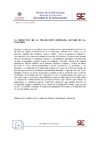Please use this identifier to cite or link to this item:
https://accedacris.ulpgc.es/jspui/handle/10553/72314
| Title: | La didáctica de la traducción literaria: estado de la cuestión | Other Titles: | The Teaching Of Literary Translation: An Overview | Authors: | García Álvarez, Ana María | UNESCO Clasification: | 570113 Lingüística aplicada a la traducción e interpretación | Keywords: | Literary Translation Teaching Methodology Scaffolding didáctica de la traducción literaria Metodología, et al |
Issue Date: | 2012 | Journal: | Education in the Knowledge Society | Abstract: | Despite the fact that translation teaching has undergone a significant change during the last two decades in relation to research from an inductive-experimental perspective focusing on the analysis of students' mental processes when translating, and that much academic work has consequently emerged, the teaching of literary translation currently lacks an appropriate theoretical and methodological scaffolding that may describe its great complexity, and which can help students to translate literature in a professional way. Our aim in this article is to review and to give a general critical overview of the theoretical and methodological framework in which the teaching, and particularly the evaluation of literary translation in history, is depicted based on prescriptive notions such as faithfulness, translatability, literality or equivalence, among others. We will also see that current quantitative research in translation teaching is insufficient if it is not complemented by qualitative content which contributes to a conscious reflection on the translation process. We will then make a didactic proposal that emphasizes the importance of establishing those types of content that can be used effectively to describe the cognitive complexity implied in the practice of literary translation, and which may consequently help to develop suitable translation strategies. Thus, we believe that the study of introspection is essential. A pesar de que la didáctica de la traducción ha experimentado desde hace dos décadas un cambio considerable en su investigación, centrada en el análisis de los procesos mentales del estudiante cuando traduce y desde la perspectiva inductivo-experimental y con numerosos trabajos al respecto, la didáctica de la traducción literaria adolece actualmente de andamiajes teóricos y metodológicos apropiados que describan su gran complejidad y puedan ayudar al estudiante a traducir literatura de manera profesional. Nuestro objetivo en el presente artículo es repasar y criticar en líneas generales el marco teórico-metodológico que ha caracterizado la enseñanza y, en particular, la evaluación de la traducción literaria a lo largo de la historia, basado en nociones prescriptivas de fidelidad, traducibilidad, literalidad o equivalencia entre otras. También veremos que las investigaciones cuantitativas que se vienen llevando a cabo en la didáctica de la traducción son insuficientes si no se complementan con contenidos cualitativos que contribuyan a una reflexión consciente sobre el proceso de traducción. A continuación estableceremos una propuesta didáctica que enfatiza precisamente la importancia de establecer aquellos contenidos adecuados que puedan describir la complejidad cognitiva implicada en la práctica de la traducción literaria y que puedan ayudar a desarrollar estrategias de traducción apropiadas. El estudio de la introspección es, en este sentido, esencial |
URI: | https://accedacris.ulpgc.es/handle/10553/72314 | ISSN: | 2444-8729 | Source: | Education In The Knowledge Society [ISSN 2444-8729], v. 13 (1), p. 40-89 |
| Appears in Collections: | Artículos |
Page view(s)
145
checked on May 31, 2025
Download(s)
172
checked on May 31, 2025
Google ScholarTM
Check
Share
Export metadata
Items in accedaCRIS are protected by copyright, with all rights reserved, unless otherwise indicated.
